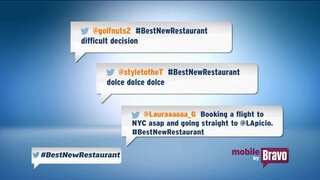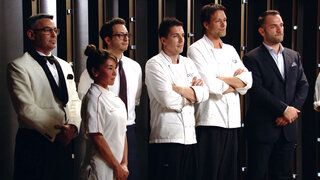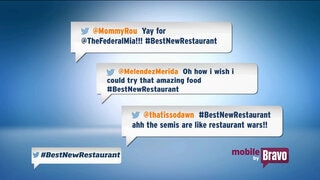Adam Platt Grills Tom Colicchio: the 10 Best Things We Learned
The 'Best New Restaurant' host reveals some industry secrets to the revered food critic.

Over twelve seasons of Top Chef, Tom Colicchio has scoured the nation for the greatest new talents in cooking. He's expanding his search with Bravo's new show Best New Restaurant, where the cooking legend will seek out the most promising new biz in the U.S.
He should know, too: the New Yorker has made a name with his steakhouse empire Craft. And during a sit-down in his hometown Tuesday night with New York magazine restaurant critic, Adam Platt, the two had a wide-ranging conversation about the food industry, the rigors of opening an establishment, and the biggest surprises Tom experienced during production.
Below, the ten best things we learned from their chat.
Tom May Not Be a Critic...
"I feel that I'm part cheerleader," he said of working with the restaurateurs on the show. "I go in there and I know what they're going through. I feel their pain when the service is going down the tubes because it happens in restaurants...I didn't feel like I was critiquing them."
...But Everyone Else Is
"When you open a restaurant there is a process by which you go through and you're getting critiqued and everyone knows it coming in," he said. "Nowadays because of social media, we're almost always getting critiqued, you can look at the user-generated sites and you're constantly looking at it."
TV Has Had an Impact on the Restaurant World
Platt noted similarities of the medium with the "participatory culture" of cooking. "The kitchen itself is the theater," said Platt. "The culture of the kitchen is out front. So I think, in that sense, these shows have fit into that. I don't know how they've affected restaurants. I think they've affected how people look at cooking, how they aspire to be chefs. I don't know if they've affected restaurants. Which is why I thought this show was quite interesting."
Tom Believes Food Critics Still Matter
"Absolutely without a doubt [critics are important]," he said. "I think maybe because there are more outlets now than there used to be. But I still think for New York City, I think there is a tremendous amount of power. We know it because you get a good review, Adam Platt writes a good review, the restaurant's jammed. I think a good review has probably more power than a bad review...If we're being honest with ourselves, you're just holding up a mirror."
Remember: It's Not Personal
"I felt a certain empathy for them," Tom noted of those who competed on Best New Restaurant. "But [my job is] very different job than a critic because I'm standing in the kitchen. So I'm wondering if critics were actually allowed to sit in the kitchen, would it color the review? It wasn't difficult at all because I felt I was being really honest. It's not personal. This is about what they're doing."
There's not a lot you can do when a critic comes in...the worst thing a chef can do is jump on a line and start cooking.”
The Restaurants Really Are New
Adhering, in part, to Tom's philosophy that restaurants need some time to grow before a restaurant can be probably judged, he shared that "the average age of the restaurants on Best New Restaurant, well, they went from six months to three years. I think the average was probably a year and a half."
Tom Was Constantly Surprised During Filming
The chef admits he had certain expectations from some of the competitors—but those were often upended: "I can tell you there were restaurants I thought were going to win because they were sort of more what I do and it didn't work out that way because, then again, this is a competition."
Best New Restaurant Isn't Just for Foodies
"We've said it multiple times in the show that it's about food, service, hospitality and, partly, how well they execute their concept," Tom said. "I would say probably 50 percent of it was food and the rest filtered in after that."
It's Important to Keep Your Cool When Critics Arrive
"There's not a whole lot you can do when a critic comes in," Tom said. "There are certain things we can do. The worst thing a chef can do is jump on a line and start cooking. Sometimes a reviewer comes in and I would call my wife... and I would sit them right next door and have them rave or just listen and here what the feedback is. I think as chefs we put a lot more in the process."
In The End, It's All About That Burger
As Platt joked, "Hamburgers are like the great...souffle of our age."







